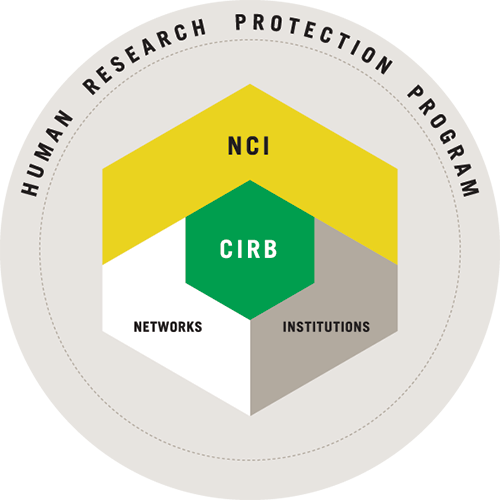 |
As the focal point of the Human Research Protection Program for the National Cancer Institute (NCI), the CIRB is dedicated to assuring that appropriate steps are taken to protect the rights and welfare of humans participating in the clinical studies conducted for the NCI. Review of studies are conducted both in advance of opening the study and through periodic reviews. We support three key constituents: the NCI, the Networks funded by the NCI that develop the research; and, institutions across the country that conduct the research.
CIRB
The CIRB consists of four separate boards — each of which is responsible for specific types of studies.
- Adult CIRB - Early Phase Emphasis
- Adult CIRB - Late Phase Emphasis
- Pediatric CIRB
- Cancer Prevention and Control CIRB
NCI
The National Cancer Institute funds an extensive national program of cancer research, including pilot, phase 1, phase 2, and phase 3 clinical trials in adults and children focused on cancer prevention, cancer care and delivery, and treatment. The CIRB is an independent organization that provides reviews of NCI-funded clinical studies.
NETWORKS
The CIRB provides review of protocols submitted by these Networks to ensure the safety of all participants in the trial. The current list of supported Networks includes:
- NCI National Clinical Trials Network (NCTN)
- NCI Experimental Therapeutics Clinical Trials Network (ETCTN)
- NCI Community Oncology Research Program (NCORP)
- Cancer Prevention Clinical Trials Network (CP-CTNet)
- Pediatric Early Phase Clinical Trials Network (PEP-CTN)
- Pediatric Brain Tumor Consortium (PBTC)
- AIDS Malignancy Consortium (AMC)
- Cancer Screening Research Network (CSRN)
INSTITUTIONS
The CIRB supports more than 1,800 institutions, such as hospitals and universities, conducting clinical studies aimed at preventing and treating cancer. The CIRB provides timely, efficient, and responsive reviews of NCI-funded clinical trials conducted at these institutions. These reviews establish the institution and Principal Investigator's local context.